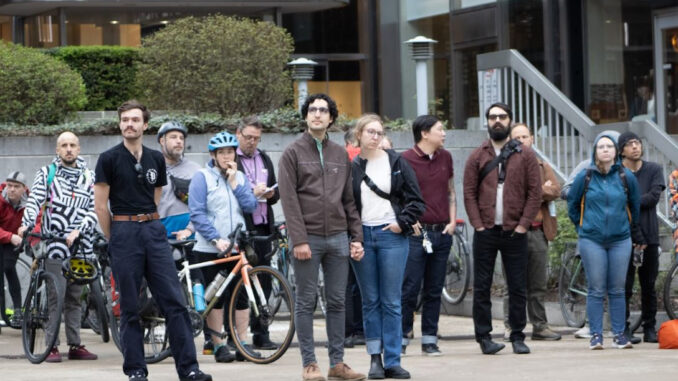
Maxwell Marcello | Staff Writer
BikePGH, held a vigil to honor James Mills.
The 67-year-old cyclist, was struck on March 26 died five days later.
The local nonprofit met at the intersection of Liberty and Stanwix in Downtown Pittsburgh to talk about bicyclist safety and Mill’s death.
Roughly two dozen cyclists gathered to pay respect to Mills and pressure the city to improve mobility.
Leading the vigil was Landy who eulogized Mills while also criticizing the lack of protections the city has for cyclists.
“Someone way back decided that this was a great place to dump traffic coming into the city all at once from several different major arteries into a densely populated urban area,” Landy said.
For many Pittsburghers, biking offers a rewarding alternative to automobiles and public transit. However, cycling in an urban environment presents significant challenges for cyclists as the possibility of being struck by a vehicle is omnipresent.
Despite the danger, many Duquesne faculty and students regularly use bicycles as a means of transportation.
One such cyclist is Garnet Butchart, an associate professor of communication and rhetorical studies at Duquesne.
“Pittsburgh is not a cyclist-friendly city. There’s not many dedicated bike lanes. So cyclists have to navigate… traffic. Its vehicles seem to have the right of way, and take it. So it can be treacherous,” Butchart said.
In spite of the risks, Butchart remains a firm supporter of cycling and the city’s efforts to improve cycling.
Improving pedestrian mobility was an issue that
then -candidate Ed Gainey campaigned on. Now as Pittsburgh’s mayor, Gainey announced the city’s participation in an international effort to reduce cyclist fatalities with the support of cyclists.
Recent calls for improving Pittsburgh’s mobility have intensified following Mills’ death.
“I’ve been a cyclist in Pittsburgh for 12 years and I try to go to every one of these vigils because we lose a part of our community every time we lose somebody on the streets,” said cyclist John Kowalski. “We just need people to slow down, and just be more aware of what’s around them.
Central to the vigil was the dedication of a ghost bike in Mills’ honor. Ghost bikes are bicycles often painted white and attached to a signpost to serve as a roadside memorial to a cyclist.
Starting in the 2000’s, ghost bikes have taken on a new purpose, as a visual reminder to motorists and cyclists alike pushing for improved mobility on urban streets.
“While they [bus and semi trucks] had a green light, and I’m sure you all are tempted to think … that James Mills made one of those gambles. One of those risky decisions. And it just didn’t work out. And he passed away,” Landy said. “And the city thought they could paint little white lines all along the street there and wash their hands of any responsibility beyond that. And that combination of decisions is ultimately what led to James’s death.”
However, among the grief was a sense of optimism that through the tragedy of Mills’ death, the city would be spurred into action.
Vision Zero is a roadway strategy designed for equitable mobility and eliminating traffic fatalities, first developed in Sweden that has since been incorporated in American cities such as Chicago and Boston. Although calls for Pittsburgh to implement Vision Zero go back years, Bush firmly believes that public pressure and the recent increase in cyclist deaths will compel the city to act faster.
“The idea behind initiatives like Vision Zero is great. I would love to live in a city with zero bike or pedestrian traffic fatalities. With this white bike we dedicate today to James Mills, a member of our community, it will serve as a stark reminder to me and to every pedestrian cyclist and driver who passes here from now on that we’re not there yet. And that we were not there in time to save James Mill’s life,” Landy said.
Mills’ Ghost Bike was fixed at the intersection with Armin Samii donating his childhood bike lock to the memorial. Once the Ghost Bike’s dedication concluded, the cyclists headed off on a ride through the city in Mills’ honor.
Also in attendance at Wednesday’s vigil was Seth Bush, the advocacy manager for BikePGH. Since the pandemic, collisions involving cyclists including fatalities have been increasing. The City of Pittsburgh sees one-third of such cases in the area. In spite of these cases, the city’s plan to implement Vision Zero was praised by Bush.
“We need to be designing our streets to be able to work for those people to stay safe. We call those Complete Streets. When streets are just designed for cars. They’re not complete streets, and we need motorists to know that you know, they are. It’s not all about cars going fast. It needs to be about people being safe,” Bush said.

